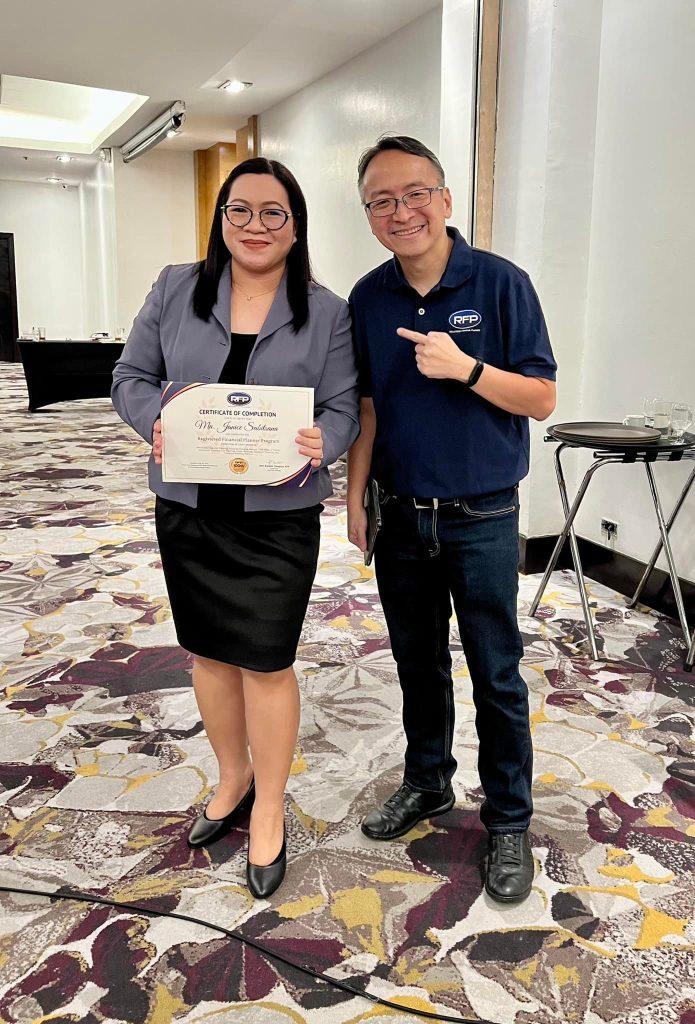Choosing the right financial professional can feel confusing, especially when you’re unsure who does what.
Do you need a financial planner, a financial advisor, or a financial coach?
Each has a unique role, and knowing their differences will help you decide who’s the best fit for your needs.
Let me share what I’ve learned from my own experiences—starting as a stay-at-home mom curious about the stock market to becoming a Registered Financial Planner (RFP) and financial literacy advocate.
Over the past decade, I’ve worked with financial experts, attended seminars, and gained certifications. Here’s what I’ve picked up along the way.
My Story: From Pinay Investor to Financial Planner
In 2014, I started my blog, Pinay Investor, while adjusting to life as a stay-at-home mom.
With a one-year-old daughter, I wanted to make the most of my time at home, so I began writing about my journey into stock market trading and investing.
Attending seminars on finance, entrepreneurship, and work-from-home opportunities opened my eyes to the importance of financial literacy—not just for myself but for others as well.
In 2015, I became the Events Director and COO of Manila Workshops, an events company specializing in seminars and workshops.
I had the privilege of working with financial experts like Marvin Germo, the founder of Stock Smarts, and Fitz Villafuerte, author of the Ready to Be Rich blog.
Both are Registered Financial Planners, and I helped promote their seminars and speaking engagements.
That same year, I attended the RFP Financial Fitness Forum, which inspired me to pursue my RFP designation.
However, it wasn’t until 2021, during the pandemic, that I finally enrolled in the program. The three-month course included eight Saturday sessions, four hours each.
By January 2023, I officially became a Registered Financial Planner.

Along the way, I also became a Licensed Financial Advisor for a top insurance company.
This gave me valuable insights into insurance and investments, but I eventually decided to resign from the role in 2023.
I wanted to focus on providing unbiased financial advice through my content without any potential conflicts of interest.
Now, as a financial coach and planner, I help people make sense of their finances and build practical strategies.
Here’s how you can figure out whether a financial planner, advisor, or coach is right for you.
What Does a Financial Planner Do?
A financial planner takes a holistic approach to your finances.
They help you create a comprehensive plan that covers all aspects of your financial life, including budgeting, saving, investing, insurance, retirement, and estate planning.
Financial planners often hold certifications like Registered Financial Planner (RFP) or Certified Financial Planner (CFP), which require rigorous training and ethical standards.
When to hire a financial planner:
- You want a long-term, big-picture plan for your financial goals.
- You’re dealing with complex financial situations like retirement planning, tax optimization, or estate planning.
- You’re ready to invest in professional advice for significant life events like marriage, buying a home, or starting a family.
What Does a Financial Advisor Do?
A financial advisor typically focuses on investment management and wealth growth. They can recommend and sell financial products like mutual funds, insurance, and retirement plans.
In the Philippines, financial advisors are often affiliated with insurance companies or investment firms and must pass licensure exams to offer their services.
When to hire a financial advisor:
- You’re looking for guidance on specific financial products or investment strategies.
- You want professional advice on growing your wealth or securing insurance.
- You’re comfortable working with someone who may earn commissions based on the products they sell.
My experience as a financial advisor helped deepen my knowledge about insurance and investments, but I ultimately chose to step away from the role to avoid conflicts of interest. As a content creator and financial planner, I want to ensure my advice remains unbiased and purely focused on what’s best for my audience.
What Does a Financial Coach Do?

A financial coach focuses on helping you build healthy money habits and achieve specific goals.
They don’t sell financial products or create complex financial plans; instead, they guide you in areas like budgeting, debt management, and saving.
Think of a financial coach as your accountability partner in your financial journey.
When to hire a financial coach:
- You’re struggling with budgeting, overspending, or debt repayment.
- You need help building confidence and discipline in managing your finances.
- You’re looking for a more hands-on, supportive approach to tackling your financial challenges.
As a financial coach, I’ve worked with individuals who needed practical, actionable steps to get their finances back on track. It’s incredibly rewarding to see clients gain control over their money and achieve their goals.
Which One Do You Actually Need?
Choosing between a financial planner, advisor, or coach depends on your current financial situation and goals.
Here are some questions to help you decide:
- Do you need a comprehensive financial strategy?
- Go for a financial planner.
- Are you focused on investments or insurance?
- A financial advisor is your best bet.
- Do you need help with budgeting or getting out of debt?
- A financial coach can guide you.
- Do you want someone who takes a holistic, unbiased approach?
- Look for a Registered Financial Planner (RFP) who doesn’t sell products but focuses on planning.
How to Become a Registered Financial Planner (RFP) in the Philippines

If you’re interested in becoming a Registered Financial Planner (RFP) in the Philippines, the process is both rewarding and straightforward.
The RFP program is designed for individuals who want to deepen their expertise in financial planning and provide professional advice to clients.
However, it’s worth noting that the program isn’t just for financial professionals. You can also take it for personal use to improve your own financial knowledge and skills.
Here’s how you can get started:
- Enroll in the RFP Program
- The program includes a series of classes covering key financial planning topics, such as investments, insurance, retirement planning, estate planning, and taxation.
- Classes are typically conducted over several weekends to accommodate working professionals.
- Complete the Requirements
- Attend all sessions
- Submit a comprehensive financial plan
- Present your financial plan (revalida)
- Apply for the RFP Certification
- After completing the RFP program requirements, you need to submit your application to RFP
- Maintain Your RFP Certification
- RFPs must participate in continuing education programs to stay updated on the latest financial trends and renew their RFP certification annually to maintain their designation.
For more details about the RFP program, including schedules and topics, visit the RFP Philippines website.
If you have specific questions about the fees or other requirements, feel free to email me directly at janice (at) thepinayinvestor (dot) com.
I’d be happy to help guide you through the process based on my own experience completing the program.
Click here when you’re ready to register for the RFP program. This is my affiliate link, and I’ll earn a small commission at no extra cost to you. Thank you for supporting my work!
Watch my RFP journey here
Final Thoughts
Understanding the differences between a financial planner, advisor, and coach can make a world of difference in your financial journey. Each role has its strengths, and the right choice depends on your needs and goals.
Looking back on my decade-long journey, I’ve realized that financial literacy isn’t just about numbers; it’s about empowering yourself to make informed decisions.
Whether you need a planner to map out your future, an advisor to guide your investments, or a coach to support your financial habits, taking that first step to seek help is already a win.
If you’re ready to take control of your finances but aren’t sure where to start, feel free to reach out. I’m here to help you navigate your journey, just as I’ve navigated mine.

